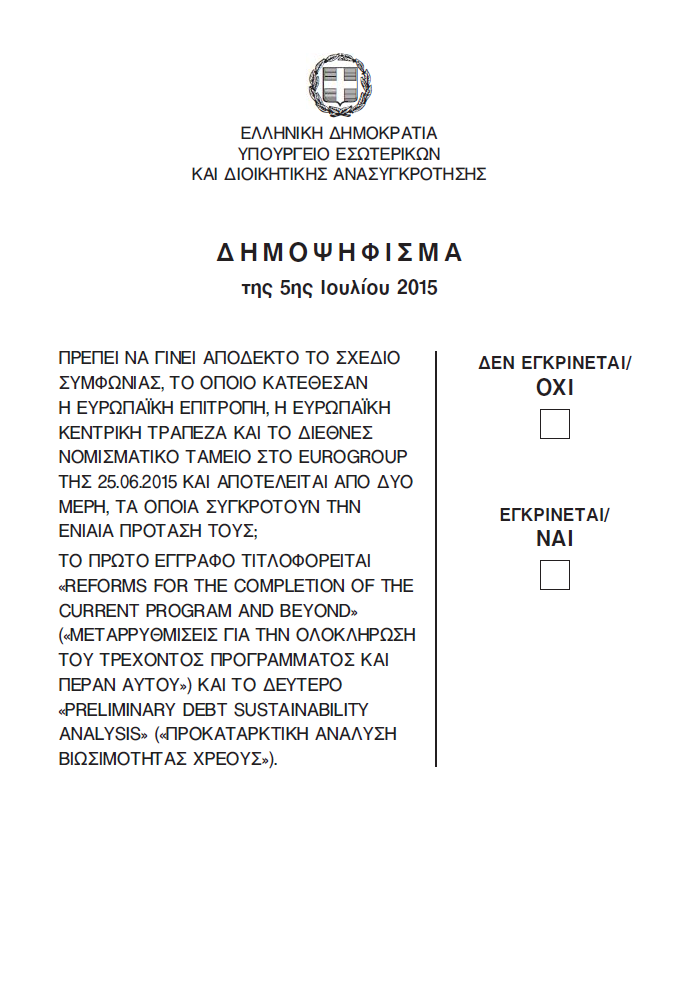It’s very interesting, this one. Greece goes into a referendum vote tomorrow, even as the world watches with bated breath. Many people are of the opinion that the referendum is on whether the people of Greece want to stay in the Eurozone or not; others will tell you that people will vote on whether they like the bailout terms or not. Hmmm. Need clarification? Here goes.
Let me firstly explain what a referendum is and what it does. Referendums are legal mechanisms used to get voters’ opinions in a format that is direct democracy driven as opposed to one that is representative democracy driven. There are some further distinctions one can make if one is a keen student of political sciences. For example, in the US, if the voters directly vote for passing of a law, then the underlying process is called as an initiative, whereas if they are voting for the repeal of an existing law, the process becomes a referendum. In many parts of the Eurozone, when direct voting is done towards getting a constitutional amendment, the technical term used is a plebiscite; a direct voting process for all issues not connected to changes in the constitution is a referendum. Well, political scientists have listed as many advantages of referendums as disadvantages.
Amongst the advantages, you obviously have a situation of sensing the pulse of the country. It increases the voter engagement with the political topics in the country. Most interestingly and importantly, this is an instrument that can be used exceedingly well by a party to secure popular mandate on an issue that was NOT critical to its basic election agenda.
However, this is also a bit like doubting the efficacy of the Parliament to pass laws that are beneficial for the country to move ahead. Dangerously, it can give very skewed results depending on the quantity and quality of the turnout. Worse, it can be used by the party in power to pass a law that it is unable to clear with the usual Parliamentary democracy machinery.
This last point is what seems to be one of the many accusations done against Greek PM Alexis Tsipras as he instigates people to saying a no in the referendum tomorrow.
So, we come back then to the referendum tomorrow. Umm, what in the world are people going to vote on? The referendum question (with 74 words) has been released and it does nothing to reassure you of the sanity of the decision to move the country towards a referendum process. Look at this.

Greek and Latin? Nah, its Greek and Greek! Well, let me translate that for you, not that it helps in any which way!
“Should the proposal that was submitted by the European Commission, the European Central Bank, and the International Monetary Fund at the Eurogroup of 25 June 2015, which consists of two parts that together constitute their comprehensive proposal, be accepted? The first document is titled ‘Reforms for the completion of the Current Programme and beyond’ and the second ‘Preliminary Debt Sustainability Analysis”
Even for a person who is sensitized to the issues in the Euro, I find the language extremely vague. The documents don’t exactly sound appetizing either. Do you really think that all those people living in the remote corners of Greece, without internet access (yep, that happens in Greece too!) will ever understand what the meaning of this crazy write up is? And assuming that the uber educated people do go around to the polling booths tomorrow, I really do hope the Government will have hired top global economists to be present at the booths talking to people about potential impacts of debt sustainability issues, oh sorry, preliminary debt sustainability analysis.
Ohk, I am going a bit further than that now. Note that the first document is titled “Reforms for the Completion of the Current Program And Beyond”. Well, well, well! You see, the current program ran all the way upto 25th June, on which the Eurozone’s portion of the Greece rescue deal expired!
So, the Greeks are being called out for a referendum to vote on an issue that is already non-existent. This has to be a first, wherein people (largely living on 60 Euro withdrawals per day) will go out to vote without understanding what the issue is, when in fact, there is no issue anymore since the thing has expired!
Finally, since I am an economist, can’t help but mull on what this is going to cost the Exchequer, which, ahm, by the way, doesn’t have much left in it anymore. PM Tsipras pegs the cost at Euro 20 million on a votebank of about 10.5 million people. That’s not what the Opposition is saying, however. The Opposition has come up with the magic figure of Euro 120 million, 6 times more than what Tsipras claims, an amount that looks ill-affordable for a non-existent issue being dished out in a non-understandable language to a non-comfortable public.
A last crazy but genius thought. Even assuming Euro 20 million, the cost works out to around Euro 2 per voter, that’s around Rs. 140 per voter. Steep! Especially by Indian standards wherein the 16th Lok Sabha was elected at a “high” cost of Rs. 17 per voter. This is an excellent new KPO/ BPO venture for India, folks. All that the referendum savvy Eurozone has to do is get the voting done on mobile platforms, wherein the counting, the analysis and results can be declared by India. Break in Europe but Make in India!
